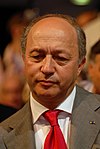French legislative election, 1986
|
|
|||||||||||||||||||||||||||||||||||||||||||||||||||||||||||||||||||||||||||
|---|---|---|---|---|---|---|---|---|---|---|---|---|---|---|---|---|---|---|---|---|---|---|---|---|---|---|---|---|---|---|---|---|---|---|---|---|---|---|---|---|---|---|---|---|---|---|---|---|---|---|---|---|---|---|---|---|---|---|---|---|---|---|---|---|---|---|---|---|---|---|---|---|---|---|---|
|
|||||||||||||||||||||||||||||||||||||||||||||||||||||||||||||||||||||||||||
|
All 573 seats to the French National Assembly 287 seats were needed for a majority |
|||||||||||||||||||||||||||||||||||||||||||||||||||||||||||||||||||||||||||
|
|||||||||||||||||||||||||||||||||||||||||||||||||||||||||||||||||||||||||||
|
|||||||||||||||||||||||||||||||||||||||||||||||||||||||||||||||||||||||||||
The French legislative elections took place on 16 March 1986 to elect the eighth National Assembly of the Fifth Republic. Contrary to other legislative elections of the Fifth Republic, the electoral system used was that of party-list proportional representation.
Since the 1981 election of François Mitterrand, the Presidential Majority was divided. In March 1983, Prime Minister Pierre Mauroy renounced the left's radical Common Programme which had been agreed in the 1970s. Wages and prices were frozen. This change of economic policy was justified by the will to stay in the European Monetary System. One year later, the Communist ministers refused to remain in Laurent Fabius' cabinet.
In opposition, the two main right-wing parties tried to forget their past quarrels. They were able to win the mid-term elections (1982 departmental elections, 1983 municipal elections, 1984 European Parliament election) and succeeded in forcing the government to abandon its policy of limiting the financing of private schools in 1984. The Rally for the Republic (RPR), led by Jacques Chirac, abandoned the traditional dirigiste and Eurosceptic Gaullist doctrines about the economy and European integration. It was then able to sign an electoral platform with the Union for French Democracy (UDF). It proposed notably to sell the companies nationalized by President Mitterrand and Pierre Mauroy.
...
Wikipedia





